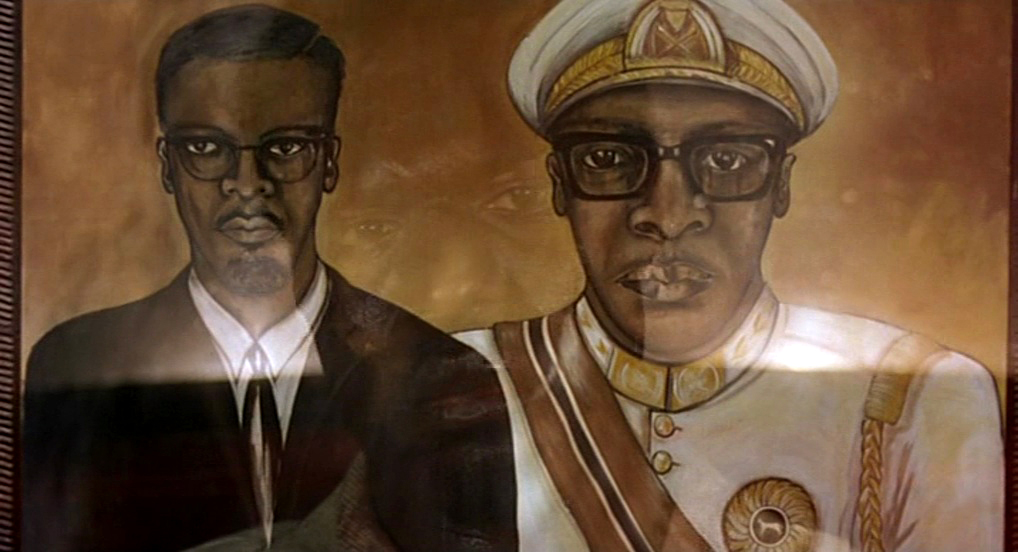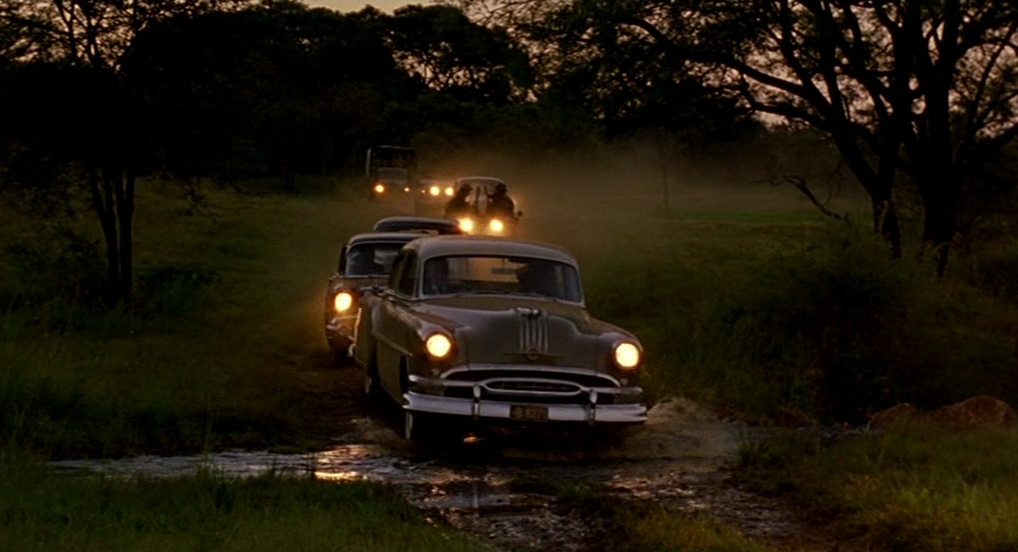Mapping Raoul Peck

Imagine if cartographers drew maps and regularly forgot provinces, regions, or even countries. Well, in the cinema world this happens very often – in articles, overviews of festivals, or yearly roundups, for example.
The filmmaker Raoul Peck isn’t ‘mapped’ as often as he ought to be. Despite a nice recent two-page spread here in Libération, it is almost as if Peck didn’t exist. Yet he has devoted two films to Patrice Lumumba – a documentary in 1992 and a ‘fiction’ film, co-written with Pascal Bonitzer, in 2000 – and has dealt with the tragedies of Haiti in Haitian Corner [1988] and The Man by the Shore [L’homme sur les quais] (an official Cannes Festival selection in 1993). There is also Sometimes in April [2005], about events in Rwanda; L’affaire Villemin [2006] (co-written as well with Pascal Bonitzer), the terrific, exemplary French television miniseries [on the 1984 case involving the tragic death of a four-year-old boy that caused endless blunders and miscalculations within the judiciary and in the media]; and another television film, L’école du pouvoir [2009], about the graduating class of the highly competitive École Nationale d’Administration (or ENA) that trains and warps the elites destined to govern France.
Think of the career of this eternal exile, who does not see himself as an exile though he was uprooted from his country at the age of nine, and carted around, from Haiti – where he returned twenty-five years later – to Africa, to the United States, to France. And then think of everything that came out of these wanderings, of being uprooted, of the culture shocks – all the films he directed that seize reality and grapple with it. There is a physical side to his work, the sense of violent confrontation. A confrontation between the director and his subject(s), but also perhaps confrontation in the inner depths of a man torn amid several cultures and several kinds of cinema, using each one of them as a secret weapon. A man who digs down deep in order to put up with Rimbaud’s rough embrace of reality, thereby fulfilling Jean Vigo’s call for French cinema to make documented fictions, while at the same time fulfilling the perennial appeal of certain enlightened and demanding French critics to make movies as courageous and aware as the films of American filmmakers.
In fact, Raoul Peck did make American movies. In Sometimes in April, financed by HBO – the cable television network that has given a number of American filmmakers the opportunity to tackle highly topical and controversial subjects (John Frankheimer’s Path to War [2002] was an HBO movie) – he delved into a subject that was by and large ignored by his American colleagues and went much further than Hotel Rwanda [Terry George, 2004], showing himself to be considerably more radical and analytic (and was therefore blamed for being didactic by people who can’t bear to face up to their responsibilities). He overtly accused the American government of blindness and inertia with regard to the genocidal Hutus (“We don’t want another Somalia,” says a government official to Debra Winger), facts that have been confirmed by recently declassified documents. The administration knew, but did nothing; this is seen in the film and some viewers were shocked by it. Nor is France exonerated for its heavy responsibility for what happened.
We dare not think that this partial absence, this silence, is due to the fact that Raoul Peck is Haitian and black. No, it must be due to the fact that Raoul Peck is constantly darting from country to country, from America to France, shifting from politics (he was minister of culture in Haiti for two years, from 1995 to 1997), to documentary filmmaking to fiction films. His camera leaps from the Congo to the French provinces, from an Africa devastated by civil war, to the corridors of government offices. How can we make sense of it? How can we put a label on it and categorize it? It’s not nice to make life so complicated for exegetes and taxidermists. You move around too much, we can’t keep up. It would be so much simpler if you would do what we expect you to do. You should be more sensible, more sober: sober writers are the counterparts of sensible voters, according to Victor Hugo.
Above all, Raoul Peck commits the ultimate sin: he constantly moves back and forth between Cinema and Television. I am deliberately using capital letters as in France there seems to be a kind of Berlin Wall between these two disciplines, these two audiovisual fields. In the United States, many directors between studio productions – Frankenheimer, Mike Nichols – shoot one or more films on personal or daring subjects for HBO or another channel before returning to cinema. But in France, aside from a few rare exceptions, there is no bridge between the two. No interaction.
One important turnaround though, a dramatic change still in line with Peck’s turbulent career, further blurs the picture: on January 10, 2010, just two days before the catastrophic earthquake that shattered Haiti’s capital, Peck was called to preside as chairman of the board over the very prestigious Parisian cinema school, La Fémis, thus now serenely looking over the future of French cinema. What a splendid and ironic occurrence!

Let’s talk cinema. I’ve kept a vivid memory of Lumumba played – brilliantly – by Eriq Ebouaney, as a proud, haunted man, of great oratorical skills, whose stubbornness worked against him. Peck doesn’t hide Lumumba’s faults, his lack of diplomacy and strategic vision. But he brings home to us the strength and tenacity that sustained him in his daily fight against evil, corruption, and despotism, qualities that enabled him to impose two months of democracy. (To paraphrase Virginia Woolf, there is no greater passion in the heart of man than the desire to have his faith shared.) Before the collusion of the colonial powers, the United States and Lumumba’s rivals (including Joseph Kasa-Vubu, whom he had known when he sold beer) executed him in shameless fashion. Roger Ebert summarized it perfectly: the film is “powerful, bloody and sad.” And he refers to a passage that had struck me too. Mobutu’s speech at the second anniversary of Independence and his request for a minute of silence in honor of Lumumba. During this silence, Raoul Peck shows shots of the execution, the burial and the dismemberment of Lumumba, and the burning of his body, a montage worthy of Kozintsev or Pudovkin. As John Dos Passos said in State of the Nation, “You can tear a man away from a country but you can’t tear a country away from a man’s heart.”
And in a way, Sometimes in April, which some people have cleverly described as a ‘feel bad movie,’ is an extension of that film, for it is about the relationship between the present and the past and shows us, as Faulkner said so well, that “the past is never dead. It’s not even past.” And it tells us that filmmakers shouldn’t show us an exit door, they have no right to let us to sneak away as in so many pseudo-progressive works; they ought to refuse to give answers or solutions that might relieve the conscience of the viewer, an irritating flaw in Hotel Rwanda. “There is no last word in this story, it’s up to you to write it,” said Samuel Fuller at the end of Run of the Arrow [Samuel Fuller, 1957]. Let us add that Raoul Peck insisted on shooting the film on location:
“This film could only make sense for me in this country; the story could only be told ethically with people who had been its main actors otherwise I would have felt like a voyeur, a usurper. That said, how do you tell an ‘untellable’ story? With what images? With what stories? Every draft seemed too limited, too incomplete, too restricted. Hence the idea of choosing among real-life accounts, of combining them in one family and finding dramatic interconnections over a period of ten years – from 1994 to 2004 – and writing a fragmented story on parallel temporal levels.”
This kind of idea – unity of family, or of place, or of time – haunts the greatest documentary filmmakers from Marcel Ophüls to Ken Burns.
But here, some readers will object, you’re discussing subject and theme. What about the actual filming? First of all, we’re struck by the intelligence and acuity of his castings: how well he directs his actors and how perfectly they incarnate their characters. Add to this quality the justness of the milieus, of the atmospheres, of the sets, never ostentatious or overdrawn: a café, an investigating magistrate’s office, the edge of a river, a country road. Never anything spectacular or falsely cinematic, never anything that smacks of a preconceived vision propping up the authors’ intentions, that condemns or absolves the characters. We have the feeling that the filmmaker is discovering his characters at the same time we are; we enter places with him and are horrified along with him by the practices of the investigating magistrate, his idiotic stubbornness and the uncontrolled blunders of the press. Uncontrolled like the prewar tabloids whose primary motive was to grab attention and defile at the expense of the human beings involved, sometimes incriminating them, even if this meant manipulating the investigation. It is easier to accuse and condemn the guilty than it is to look at them, said Marcel Pagnol.
Raoul Peck also pays meticulous attention to feelings, small details and behavioral characteristics that many directors eliminate because they feel they don’t carry the action forward. But for Raoul Peck the action consists in X-raying power relationships, and the human and social damage they cause. His is a cinema that wants to show, simply and unostentatiously, which is not so common, that the first revolutionary principle consists in saying, like George Orwell, that 2+2=4, in the hope that the rest will follow.
This text was published as a foreword to Bertrand Tavernier, Stolen Images: Lumumba and the Early Films of Raoul Peck (New York: Seven Stories Press, 2012), translated from the French by Catherine Temerson.
A big thank you to Bertrand Tavernier
Images (1) and (2) from Lumumba (Raoul Peck, 2000)

